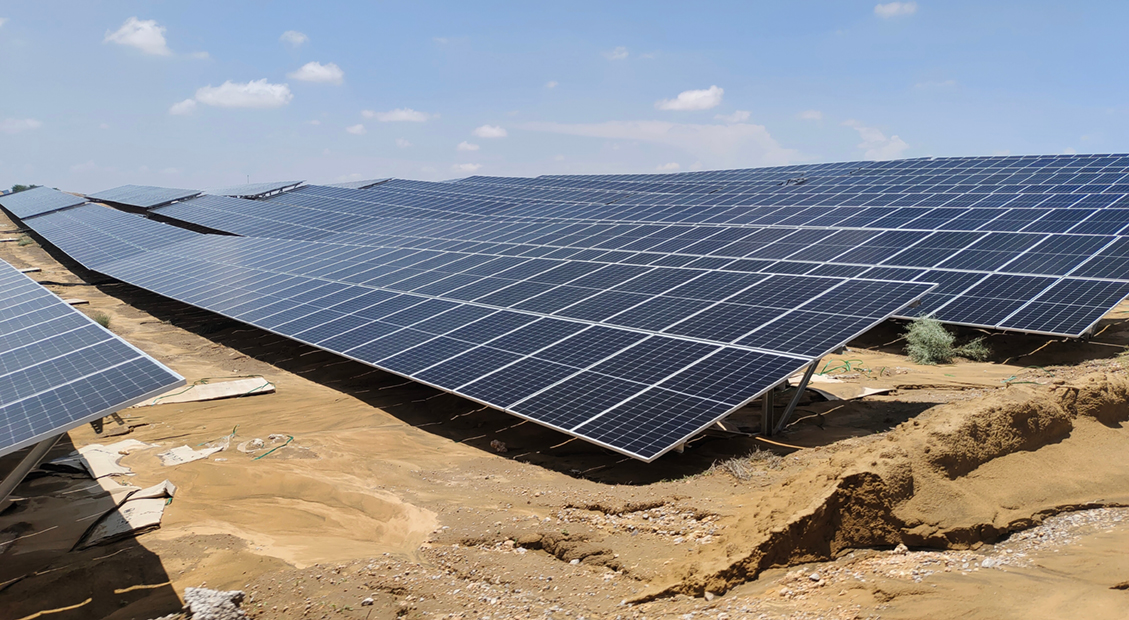As the world’s second most populous country and the fifth largest economy in the world, India’s domestic demand for energy grows exponentially.
Rajasthan is the largest Indian state by area and the seventh largest by population, making it an area with intensive energy consumption.
Responding to the state's increasing energy demand, the Asian Infrastructure Investment Bank (AIIB) partnered with Enel Green Power (EGP) in financing a 300-megawatt, alternating current (MWAC) solar park in the Bikaner district of Rajasthan. EGP’s parent company, Enel, is a global leader in power distribution, Enel ranked in 2020 as the world’s biggest power company by revenue.
The Enel Green 300 MWAC Solar Project was approved by AIIB in July 2021 for nonsovereign-backed financing in local currency Indian rupees. The financing aims to promote electricity generation from solar energy resources, as part of AIIB's commitment to financing Infrastructure for Tomorrow (i4t) for sustainable development.
The project advances AIIB’s four main corporate priorities by counting toward the Energy, Private Capital Mobilization and Green Infrastructure targets. It also adds value to the 50:50 by 2030 target, which aims to increase private sector's share in AIIB’s portfolio to 50 percent.
Cultural Dimension
Bikaner, the project site, is located in the northwest area of Rajasthan, expanding into the Thar desert, thus opening it to the benefits of a hot desert climate ideal for the generation of solar energy. The project taps into Rajasthan’s cultural heritage, as these lands have been home to the Rajput dynasty, which gave roots to the Suryavanshi dynasty in the 15th century, referred to as the “Solar dynasty” or “House of the Sun.” This is based on the belief that members of the ruling family are the “Descendants of the Sun.”
This cultural dimension is relevant to the geographic location of the project since history and tradition play integral roles across all sectors of life in Rajasthan to this day. Their rich Rajput-related culinary, textile and festival traditions, the sandstone sculptures and magnificent palaces (known as the “Hill Forts of Rajasthan,” listed among UNESCO’s World Heritage Sites) are the building blocks of the identity of Rajasthan and its people.
Partners and Collaborators
The Enel Green 300 MWAC Solar Project is co-financed with the International Finance Corporation and British International Investment. AIIB is providing a senior debt in local currency equivalent to USD50 million.
The project not only advances sustainability targets: it also helped set a precedent for future collaborations between trusted multilateral development banks, reputable energy developers and leading renewable energy manufacturers.
EGP, AIIB’s client, is a subsidiary of Enel Group for the development and operation of sources of renewable energies across Europe, the Americas, Asia, Africa and Oceania. It is a global leader in the green energy sector with a managed capacity of over 49 gigawatts (GW) across a generation mix that includes wind, solar, geothermal and hydropower. The project has also added one of its first solar power plant to EGP’s Indian subsidiary portfolio.
Advancing the Renewable Energy Agenda, Protecting Biodiversity
This solar energy project will contribute to meeting India's National Renewables Goals for 2022, which includes achieving 100 GW of solar power generation capacity by 2022, up from around 35 GW of solar in 2019. The project is also expected to reduce greenhouse gas emissions by about 592,174 tons of carbon dioxide equivalent annually. Incidentally, by 2020, India was already the fourth most attractive renewable energy market in the world, ranking fourth in wind power, fifth in solar power and fourth in renewable power installed capacity.
As part of its environmental and social impact strategy, EGP is also very much involved in the protection of biodiversity and natural heritage. EGP's ESG monitoring team paid particular attention to the potential impacts on biodiversity, including loss of habitat, impacts on bird species due to collision and electrocution hazards and heat-related incidents. While it has been confirmed that there are no protected areas or important bird areas within a 5-kilometer radius of the project site, a separate biodiversity study was conducted, showing the presence of threatened and migratory species of birds in the study area, but no critical habitat values for these species.
EGP hired environmental and social specialists to carry out relevant actions to mitigate the risks, protect wildlife and address labor, health, and safety issues. These efforts and other similar measures applied in the implementation of other renewable power projects in the same region. contribute toward mitigating projects impacts while meeting India's renewable energy agenda.
AIIB is one with EGP in protecting biodiversity. The Bank recently partnered with the Beijing Municipal Government to monitor and record nocturnal bird migration over Beijing to inform further research and studies on biodiversity. Fascinated by the effortful route, AIIB installed recording devices on the Bank’s headquarters rooftop to track bird species migrating from Siberia to Australia and New Zealand while observing their behaviors.


